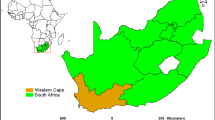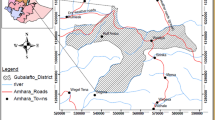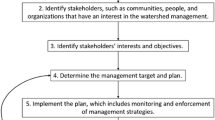Abstract
St. Vincent and the Grenadines is an archipelagic state of the Caribbean that regularly suffers natural disasters; climate change is increasing the frequency of intense hurricanes and storms. The southernmost watersheds of St. Vincent have a rugged topography that favours flash-flooding in rainy events, with great damage because the area concentrates most of the country’s population and infrastructure. To deal with this problem the Government has developed studies, engineering works and a watershed management plan. Land use management is an effective way of controlling hydrological impacts; the plan divides the watersheds in three uses, nature conservation (46%), agriculture and agroforestry (24%), and urban (30%), with categories, establishing permitted, prohibited and restricted activities. The area is close to the limit of urban development; if further expansion were essential it should be done by increasing density in lower and flatter areas. Many houses, usually low-income settlements, are in flooding or landslide risk areas, which should be decolonized, changing land use. It is also necessary to avoid hillside arable crops. Adaptation to climate change through land use management is essential, although unfortunately less socially and politically appreciated than engineering works.





Similar content being viewed by others
References
Angeles, M. E., Gonzalez, J. E., Erickson, D. J., & Hernández, J. L. (2007). Predictions of future climate change in the caribbean region using global general circulation models. International Journal of Climatology, 27(5), 555–569.
Biasutti, M., Sobel, A. H., Camargo, S. J., & Creyts, T. T. (2012). Projected changes in the physical climate of the Gulf Coast and Caribbean. Climatic Change, 112(3–4), 819–845.
Biswas, A. K. (1990). Watershed management. International Journal of Water Resources Development, 6(4), 240–249.
Boongaling, C. G. K., Faustino-Eslava, D. V., & Lansigan, F. P. (2018). Modeling land use change impacts on hydrology and the use of landscape metrics as tools for watershed management: The case of an ungauged catchment in the Philippines. Land Use Policy, 72, 116–128.
Boruff, B. J., & Cutter, S. L. (2007). The environmental vulnerability of Caribbean island nations. Geographical Review, 97(1), 932–942.
Brooks, K. N., Ffolliot, P. F., & Manger, J. A. (2013). Hydrology and the management of watershed (4th ed.). Ames: Wiley–Blackwell.
Caballero, L. A., Easton, Z. M., Richards, B. K., & Steenhuis, T. S. (2013). Evaluating the bio-hydrological impact of a cloud forest in Central America using a semi-distributed water balance model. Journal of Hydrology and Hydromechanics, 61(1), 9–20.
Cashman, A., Nurse, L., & John, C. (2010). Climate change in the Caribbean: The water management implications. The Journal of Environment & Development, 19(1), 42–67.
CCME (2016). Summary of integrated watershed management approaches across Canada. Canadian Council of Ministers of the Environment.
Christensen, J. H. (2010). Summaries of likely climate change impacts, by country. In D. Verner (Ed.), Reducing poverty, protecting livelihoods, and building assets in a changing climate. Social implications of climate change for Latin America and the Caribbean (pp. 373–400). Washington, DC: The World Bank.
Culzac-Wilson, L. (2008). St Vincent & the Grenadines. In D. C. Wege & V. Anadon-Irizarry (Eds.), Important Bird Areas in the Caribbean: Key sites for conservation (pp. 295–308). Cambridge: Birdlife International.
Dewan, A. M., Yamaguchi, Y., & Rahman, M. Z. (2012). Dynamics of land use/cover changes and the analysis of landscape fragmentation in Dhaka Metropolitan, Bangladesh. GeoJournal, 77(3), 315–330.
ECLAC. (2011). An assessment of the economic impact of climate change on the water sector in Saint Vincent and the Grenadines. United Nations: Economic Commission for Latin America and the Caribbean.
Enríquez-de-Salamanca, A., Díaz-Sierra, R., Martín-Aranda, R. M., & Santos, M. J. (2017). Environmental impacts of climate change adaptation. Environmental Impact Assessment Review, 64, 87–96.
FAO. (2017). Watershed management in action—Lessons learned from FAO field projects. Rome: FAO.
Ferdinand, I. M. A. (2006). Hurricane risk reduction strategies in the Windward Islands: Public and practitioner’s perspectives. Thesis. Coventry University.
GSVG. (2006a). Kingstown and Arnos Vale drainage improvement study. Project No. SVGDMP-CON-ICB-F-B15/03. Kingstown: Government of St. Vincent and the Grenadines-DLN Consultants.
GSVG. (2006b). Island wide flood risk assessment study. Project No. SVGDMP-CON-ICB-F-B12/03.Kingstown: Government of St. Vincent and the Grenadines-DLN Consultants.
GSVG. (2014a). Rapid Damage and Loss Assessment (DaLA). December 24–25, 2013 Floods. Report. Kingstown: Government of Saint Vincent and the Grenadines.
GSVG. (2014b). Hydrology/hydraulic modeling and geotechnical site investigation of bridges, fords and rivers. Contract No. 783/2014. Kingstown: Government of St. Vincent and the Grenadines-Euroconsult.
GSVG. (2018). Protected areas. National parks, rivers and beaches authority. Government of Saint Vincent and the Grenadines. http://nationalparks.gov.vc. Accessed May 20 2018.
GSVG, NEMO, UNISDR, & ECHO. (2018). Disaster Risk Reduction Country Document. Saint Vincent and the Grenadines. Government of Saint Vincent and the Grenadines-National Emergency Management Office (NEMO)-United Nations Office for Disaster Risk Reduction (UNISDR)-European Commission’s Humanitarian Aid and Civil Protection department (ECHO). http://dipecholactools.org/saintvincent. Accessed April 10 2018.
Hanson, D., Steenhuis, T. S., Walter, M. F., & Boll, J. (2004). Effects of soil degradation and management practices on the surface water dynamics in the Talgua River watershed in Honduras. Land Degradation and Development, 15, 367–381.
Heathcote, I. W. (2009). Integrated watershed management: Principles and practice (2nd ed.). NJ: Wiley.
Jones, P. D., Harpham, C., Harris, I., Goodess, C. M., Burton, A., Centella-Artola, A., et al. (2015). Long-term trends in precipitation and temperature across the Caribbean. International Journal of Climatology, 36(9), 3314–3333.
Jones, J. J., Stephenson, T. S., Taylor, M. A., & Campbell, J. D. (2016). Statistical downscaling of North Atlantic tropical cyclone frequency and the amplified role of the Caribbean low-level jet in a warmer climate. Journal of Geophysical Research: Atmospheres, 121(8), 3741–3758.
Kang, M. G., & Park, S. W. (2015). An adaptive watershed management assessment based on watershed investigation data. Environmental Management, 55, 1006–1021.
Karmalkar, A. V., Taylor, M. A., Campbell, J., Stephenson, T., New, M., Centella, A., et al. (2013). A review of observed and projected changes in climate for the islands in the Caribbean. Atmósfera, 26(2), 283–309.
Korah, P. I., & Cobbinah, P. B. (2017). Juggling through Ghanaian urbanisation: Flood hazard mapping of Kumasi. GeoJournal, 82(6), 1195–1212.
Le Friant, A., Boudon, G., Arnulf, A., & Robertson, R. E. A. (2009). Debris avalanche deposits offshore St. Vincent (West Indies): Impact of flank-collapse events on the morphological evolution of the island. Journal of Volcanology and Geothermal Research, 179(1–2), 1–10.
Lugo, A. E. (2000). Effects and outcomes of Caribbean hurricanes in a climate change scenario. The Science of the Total Environment, 262(3), 243–251.
Mashi, S. A., & Shuaibu, H. S. (2018). People and sustainable land management: Assessment of stakeholders knowledge of the nature of landuse/cover change in Abuja, Nigeria. GeoJournal, 83(3), 545–562.
McDowell, W. H. (2001). Hurricanes, people, and riparian zones: Controls on nutrient losses from forested Caribbean watersheds. Forest Ecology and Management, 154(3), 443–451.
Narimani, R., Erfanian, M., Nazarnejad, H., & Mahmodzadeh, A. (2017). Evaluating the impact of management scenarios and land use changes on annual surface runoff and sediment yield using the GeoWEPP: A case study from the Lighvanchai watershed, Iran. Environmental Earth Sciences, 76, 353.
Nielsen, S. T. (2010). Coastal livelihoods and climate change. In D. Verner (Ed.), Reducing poverty, protecting livelihoods, and building assets in a changing climate. Social implications of climate change for Latin America and the Caribbean (pp. 123–165). Washington, DC: The World Bank.
Peterson, T. C., Taylor, M. A., Demeritte, R., Duncombe, D. L., Burton, S., Thompson, F., et al. (2001). Recent changes in climate extremes in the Caribbean region. Journal of Geophysical Research, 107(D21), 4601.
Pratomo, R. A., Jetten, V. D., & Alkema, D. (2010). A comparison of flash flood response at two different watersheds in Grenada, Caribbean Islands. International Symposium on Geophysical Issues. IOP conference series: Earth and environmental science, 29, 012004.
Pretty, J. N., & Shah, P. (1997). Making soil and water conservation sustainable: From coercion and control to partnerships and participation. Land Degradation and Development, 8, 39–58.
Ramos-Scharrón, C. E., & LaFevor, M. C. (2016). The role of unpaved roads as active source areas of precipitation excess in small watersheds drained by ephemeral streams in the Northeastern Caribbean. Journal of Hydrology, 533, 168–179.
Rhiney, K. (2015). Geographies of Caribbean vulnerability in a changing climate: Issues and trends. Geography Compass, 9(3), 97–114.
Robertson, R. E. A. (2005). St. Vincent and the Grenadines. In J. M. Lindsay, R. E. A. Robertson, J. B. Shepherd, & S. Ali (Eds.), Volcanic hazard atlas of the Lesser Antilles (pp. 241–261). Trinidad and Tobago: University of the West Indies.
Robinson, S. (2017). Climate change adaptation trends in small island developing states. Mitigation and Adaptation Strategies for Global Change, 22(4), 669–691.
Rossing, T. (2010). Water scarcity, climate change, and the poor. In D. Verner (Ed.), Reducing poverty, protecting livelihoods, and building assets in a changing climate. Social implications of climate change for Latin America and the Caribbean (pp. 21–62). Washington, DC: The World Bank.
Rossing, T., & Rubin, O. (2010). Climate change, disaster hot spots, and asset erosion. In D. Verner (Ed.), Reducing poverty, protecting livelihoods, and building assets in a changing climate. Social implications of climate change for Latin America and the Caribbean (pp. 63–91). Washington, DC: The World Bank.
Showqi, I., Rashid, I., & Romshoo, S. A. (2014). Land use land cover dynamics as a function of changing demography and hydrology. GeoJournal, 79(3), 297–307.
Simpson, M. C., Clarke, J. F., Scott, D. J., et al. (2012). CARIBSAVE Climate Change Risk Atlas. St. Vincent and the Grenadines. Barbados: DFID-AusAID-CARIBSAVE.
Soil Conservation Service. (1985). National engineering handbook. Section 4-Hydrology. Washington DC: USDA.
Van der Zaag, P. (2005). Integrated Water Resources Management: Relevant concept or irrelevant buzzword? A capacity building and research agenda for Southern Africa. Physics and Chemistry of the Earth, 30, 867–871.
Worte, C. (2017). Integrated watershed management and Ontario’s conservation authorities. International Journal of Water Resources Development, 33(3), 360–374.
Zhang, G., Guhathakurta, S., Lee, S., Moore, A., & Yan, L. (2014). Grid-based land-use composition and configuration optimization for watershed stormwater management. Water Resources Management, 28(10), 2867–2883.
Zhou, Y., Wang, Y., Gold, A. J., August, P. V., & Boving, T. B. (2014). Assessing impact of urban impervious surface on watershed hydrology using distributed object-oriented simulation and spatial regression. GeoJournal, 79(2), 155–166.
Zimale, F. A., Tilahun, S. A., Tebebu, T. Y., Guzman, C. D., Hoang, L., Schneiderman, E. M., et al. (2017). Improving watershed management practices in humid regions. Hydrological Processes, 31(18), 3294–3301.
Author information
Authors and Affiliations
Corresponding author
Ethics declarations
Conflict of interest
The author declares that there is no conflict of interest.
Rights and permissions
About this article
Cite this article
Enríquez-de-Salamanca, Á. Vulnerability reduction and adaptation to climate change through watershed management in St. Vincent and the Grenadines. GeoJournal 84, 1107–1119 (2019). https://doi.org/10.1007/s10708-018-9914-z
Published:
Issue Date:
DOI: https://doi.org/10.1007/s10708-018-9914-z




